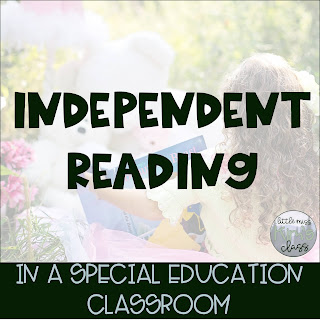According to Fountas & Pinnel, "During independent reading, students read books of their choosing for a sustained period of time. Minilessons, brief conferences, and opportunities to share thinking support students' engagement with books and increase their competencies."
If you want to read more about independent reading (including the benefits and set up tips) from the literacy gurus, Fountas & Pinnell, check out this link!
I added independent reading time to our schedule a few school years ago and I'll never skip it again! Yes, we have to differentiate and modify how independent reading works in our classroom... but I've seen students make so much progress and grow a love for reading by spending the time doing it! I'm going to answer some of the most frequently asked questions I get about independent reading in our classroom here 
My students aren't reading yet or are emergent readers... why should I do independent reading?
My students aren't reading yet... what materials should I use?
This is often one of the toughest things about independent reading... We have such a wide range of learners in classrooms like ours. Some students can read and some are still emergent readers. Even if students aren't reading yet, they can still participate in independent reading in ways that meet their needs. Your biggest goal is to find materials that align to your students interests!
My students aren't reading yet... how should independent reading actually look in my classroom?

My students aren't reading yet or are emergent readers... why should I do independent reading?
- It allows students to discover what types of books they're interested in.
- It helps students develop good reading habits (i.e. reading every day!).
- It gives students confidence with reading!
My students aren't reading yet... what materials should I use?
This is often one of the toughest things about independent reading... We have such a wide range of learners in classrooms like ours. Some students can read and some are still emergent readers. Even if students aren't reading yet, they can still participate in independent reading in ways that meet their needs. Your biggest goal is to find materials that align to your students interests!
- Books (in a variety of levels and with a variety of topics that your students are interested in!)
- Newspapers
- Catalogs/ Magazines
- Audio books
- Familiar books (books you've read during shared reading, read aloud and guided reading)
My students aren't reading yet... how should independent reading actually look in my classroom?
- Do NOT organize your books/ library by level! You can organize books by theme or author but there is no reason to organize them by level.
- Provide students with books that are familiar to them (books from read aloud or shared reading are great!). Then students can retell the familiar story as they look at the pictures and possibly read words they recognize in the book.
- Teach students how to tell stories by using the pictures.
- Have students "partner" or "buddy read" with a peer.
- Sit and read with your students! Model independent reading and a love for books too. Ask students about what they reading. Ask them to tell you about the pictures.
Do you have independent reading time in your classroom? I'd love to hear your tips and how it works in your classroom!



